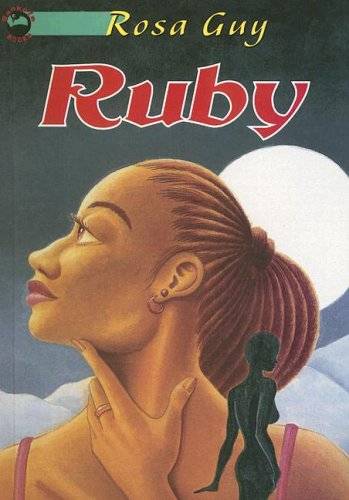Ruby
Rosa Guy

Though ostensibly written for young adult readers her stories have a richness and maturity that appeals to any age. She writes of young lives with the respect and integrity they deserve, without condescension either in language or in tone. Ruby is the story of Ruby Cathy, a desperately lonely, beautiful brown teen-ager growing up in Harlem, a virtual prisoner of her suspicious, often brutal, West Indian father. Ruby’s older sister, Phyllisia – whom the reader has met earlier as the protagonist of The Friends – is no help. All she does is sit and read, thereby escaping to some extent her own unhappiness and her sister’s apparent misery.
Calvin Cathy, the girls’ father, chases away any boy who has the temerity to approach his daughters: whether to attempt to steal a kiss or to tutor Ruby out of her failing grades at school. School is nearly impossible for Ruby. Made the butt of jokes and called an Uncle Tom because she helps a crippled white woman teacher on and off with her coat, Ruby is ostracized by her class- mates who do not understand that such courtesy is an essential part of Ruby’s sense of her own dignity and responsibility as a human being. She is deeply unhappy until she meets and falls in love with Daphne.
Daphne Duprey is a tall, gray-eyed, strong muscled girl who has set two goals for herself: to remain ‘calm, cool, collected and intelligent,’ in whatever situation, and to avoid risking her life ‘on a hummer.’ Daphne is a rare character in black American fiction. Not only is she a very young woman who takes her destiny into her own hands, she becomes, somehow, a master over her own history. She decides, after careful reasoning, what kind of life she intends to lead, then calmly pursues it. Her struggles over moral questions are minimal because her faith in herself, and her right to be herself, is absolute. Though not nearly so sympathetic a character as Ruby, she is distinctly admirable. And above all, intelligent.
What she has already given up: a softness for cripples, American racists (which the white woman teacher is) among them, she values in Ruby, whom she realizes is ‘civilized,’ uncorrupted by the pervasive American indifference to human suffering. Loving Ruby, however, (who can not stand up to her father in affirming her love for Daphne) reinforces Daphne’s contempt for this very softness and generosity in Ruby’s character. She realizes that because of these qualities in Ruby, there is a chance that the love they share will inhibit her, Daphne’s, educational and political growth: college, a preparation for future revolutionary work.
She could ruin her life – which she understands is valuable, both to herself and to black people, ‘on a hummer,’ i.e., (in this case) too deep a love for the wrong person. Who, being the wrong person, would ask the wrong sacrifices of her. It is in the handling of the love affair between Daphne and Ruby that Ms. Guy shows herself a master in writing of the emotions, ideas and fears of post-adolescents. For it is not, this story, sensational. It is not about – really – being gay or bi- sexual. (At the end Daphne ‘decides’ to go straight, ‘for a while,’ because she has promised her mother. Ruby thinks of returning the affections of a male friend.)
It is a love story, and like most love stories it is about the search for some- one who cares, the discovery – after immense longing and loneliness – of the ideal person in whom to trust, upon whom one may rely, to whom one may offer one’s bruised and yearning heart, and from whom one may expect gentle and loving treatment of this gift. When I finished the hook I was most grateful for Ms. Guys ability to depict her characters’ intelligence.
For these are characters who think about the world, who talk about politics, who are at ease with ideas of more than one interpretation. It has distressed me that some recent novels by black writers are devoid of any such complexity, and that the characters seem mere sexual compulsions, mindless, soulless, frightening in their limited ability to comprehend a world beyond the genitals. Though it is unfortunately true that novels about black folks endlessly fucking sell better than those in which blacks exhibit an ability to think, this hardly seems a valid reason to sell back to society the same stereotype it has so cleverly foisted upon us. Ruby we need. Very much. ~ Alice Walker, The Black Scholar, Vol. 8, No. 3, THE NON-ALIGNED MOVEMENT (December 1976)
Check for it on:
Details
| ISBN | 9781933491042 |
| Genre | YA Fiction (Young Adult) |
| Copyright Date | 1976 |
| Publication Date | 01-Oct-05 |
| Publisher | Just Us Books, Inc. |
| Format | Paperback |
| No. of Pages | 224 |
| Language | English |
| Rating | Great |
| BookID | 10885 |
